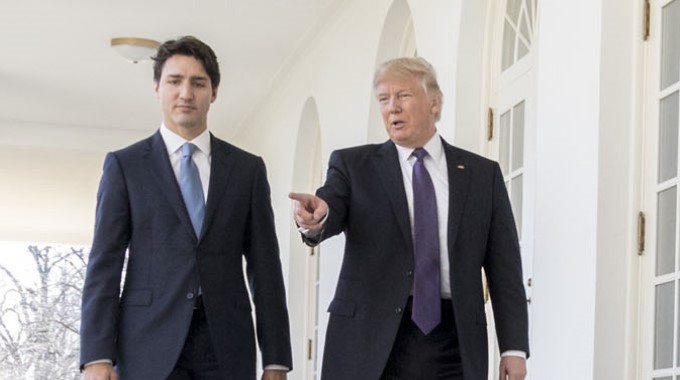
Will Canada get a NAFTA deal this week?
Your guess is as good as mine.
On the one hand we have the erratic political leader with thin skin who lets personal insults get in the way of business, and on the other hand we have Donald Trump.
The two leaders are more alike than most would think.
Look at what they are saying even.
“I’ve said from the beginning no NAFTA deal is better than a bad NAFTA deal. And we are going to remain firm on that principle because Canadians expect us to stand up for them,” Trudeau said repeatedly last week.
Compare that to Trump.
“If we don’t make a fair deal for the U.S. after decades of abuse,Canada will be out,” Trump said. He also urged Congress not to “interfere” with negotiations “or I will simply terminate NAFTA entirely & we will be far better off.”
Both say they want a good deal but won’t take a bad deal.
Trump has been clear in what he wants including concessions from Canada on huge tariffs of almost 300% on any American dairy heading north.
What is Trudeau clear on?
He wants a chapter on gender in the deal.
Has he demanded the United States reduce their 300% tariff on tobacco?
The Americans are as protectionist as anyone else for their favoured industries but Trudeau hasn’t sought to break that down, he wants gender included in the deal.
That is what is important to him.
For people that wonder why I would harp on that, the updated Canada-Chile trade agreement includes a chapter on gender that has lots of flowery language and no teeth.
A Party shall not avail itself of the dispute resolution mechanism provided for in Chapter N (Institutional Arrangements and Dispute Settlement Procedures) with respect to any matter arising under this Chapter.
It was inserted at Trudeau’s insistence. Yet it means nothing in reality.
Matters of substance.
What matters of substance has Trudeau pushed in the NAFTA talks?
He has said he will stand by supply management even as Trump threatens the auto industry with tariffs if no concessions are given on dairy.
Consider that the Government of Canada own stats say that the dairy industry employs about 41,000 people directly in both farm and processing. The auto industry employs 125,000 directly and contributes $19 billion to the economy.
Trump’s agriculture secretary Sonny Perdue is on the record repeatedly saying that the Americans are not trying to do away with supply management. They do want some concessions and some access, we aren’t willing to budge according to Trudeau.
So we won’t give the Americans any access to our dairy market while our protected dairy giants like Saputo and Agropur buy up American dairy operations.
Did you know that?
Like most protected sectors in Canada, our guys are protected from competition from the Americans but compete on their turf.
Where do the Boston Bruins and Boston Celtics play? At TD Garden, named for TD Bank, a Canadian company. Canadian banks like TD, RBC and BMO are incredibly active in the United States.
But so are our dairy operators.
Saputo owns brands such as Morningstar Foods, Betin, and recently purchased a line of products from Southeast Milk. That’s just part of their operations.
Now Saputo doesn’t get too involved in the politics of business compared to others. Quebec’s dairy farmers on the other hand are heavily involved.
Quebec dairy farmers are big players in the United States.
Many of them are also owners of dairy co-operative Agropur.
This company that is owned by Quebec’s dairy farmers brags on its own website of being the fifth largest producers of milk and cheese in the United States.
Agropur is riding high in the United States. In 2015, U.S. earnings represented 43.8% of sales, up from 35.9% in 2014.
Those numbers have only increased since 2015.
The American operations of Agropur, owned by more than 3,000 Quebec dairy farmers, include operations in Minnesota, Wisconsin, South Dakota and Idaho.
Farmers in those markets face extreme barriers in the Canadian market.
Yet Justin Trudeau would rather ensure there are no concessions on supply management to protect an expansionist Quebec dairy cartel even if that means harming the much larger and economically more significant auto sector.
Is that what Trudeau means when he says no deal is better than a bad deal?
Trudeau had the chance to make a deal earlier. Before things soured between the PM and Trump there was an offer made to Canada. Trump offered to do a bilateral deal like Mexico has just done.
Trudeau’s response was to say that he would stand with Mexico. Well they didn’t stand with us.
Now the PM has put Canada in a bad spot and he has choices to make.
Is he really willing to sacrifice the whole auto sector to avoid any concessions on dairy?
We better hope not.

